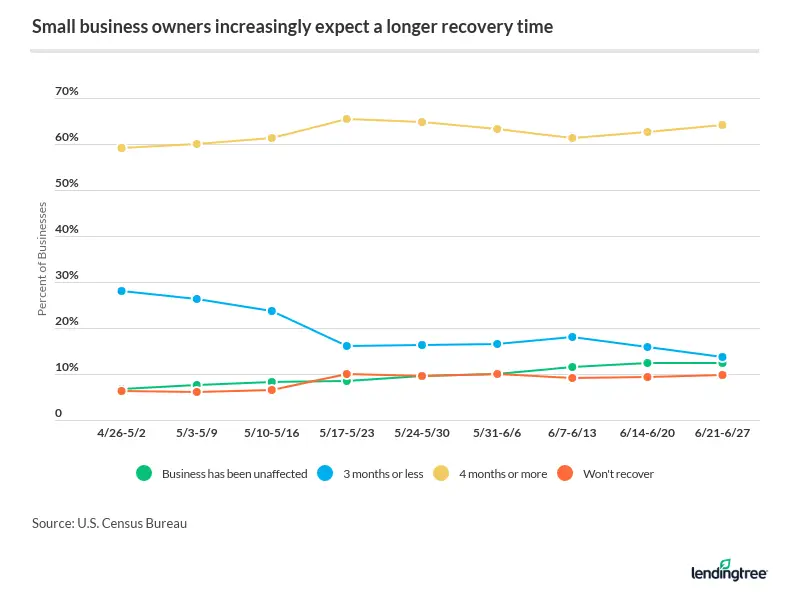Where Small Business Owners Have the Grimmest Outlook
Across the U.S., the rate of small business owners saying their businesses won’t return to normal is up more than 50% since the beginning of May, according to the latest from the Census Bureau’s weekly Small Business Pulse Survey. And their pessimism could be warranted.
The U.S. unemployment rate is 11.1% as the country faces another surge in the number of new coronavirus cases being reported daily. While COVID-19 is a national issue, the outbreaks are a local phenomenon — and the level of pessimism in the business community varies greatly by city.
Key findings
- Austin, Texas, has the highest rate of small business owners — 16.5% — who believe operations won’t return to normal compared with a year ago.
- Another Texas city, San Antonio, takes second place, as 14.9% don’t think their business will return to last year’s level. In fact, more than 62% of San Antonio small business owners believe it’ll take at least four months before business is back to normal.
- San Jose ranks just below San Antonio, with 14.8% of small business owners saying things won’t return to normal. Another 68.1% say it’ll take four or more months to recover.
- New York, the city hit hardest by the coronavirus so far, has many business owners who don’t see things returning to normal for a while. Almost 65% say it’ll take at least four months until things return to normal.
- On the other side, small business owners in some cities do see light at the end of the tunnel — even if it may be further away. In Raleigh, N.C., Salt Lake City and Sacramento, Calif., greater than 95% of businesses think things will return to normal at some point, if they haven’t already.
- Even in places where small business owners believe they’ll return to a normal level of business at some point, most think they may have to wait for 2021. On average, 65.4% of small business owners think it will be four months or longer until business returns to normal.
- The mood in the accommodation and food services industry is especially bleak. Nearly 71% of small business owners say it will be four months or longer before operations return to normal, while 17.6% say things won’t return to last year’s levels — the highest of any industry.
Where the most businesses say things won’t recover
No. 1: Austin, Texas
In Austin, 16.5% of small business owners say their business won’t return to levels seen a year ago, which was the highest rate of any metro in the study. Additionally, 60.6% say it will take four or more months to return to normal.
Travis County — where Austin is located — posted a new daily record for positive coronavirus cases on the final day that the Census Bureau survey responses were collected, which could be a reason for the local pessimism. (The number of new cases in the county hit another high on July 8.)
The Texas city is unique in that it has the highest rate of businesses saying things won’t return to normal, while also having a significant portion — 16.9% — of small business owners stating there has been little or no effect on their business’s usual level of operation.
No. 2: San Antonio, Texas
San Antonio ranks second and — like Austin — has seen a recent uptick in coronavirus cases. Bexar County, where San Antonio is located, also saw a record for the number of cases on June 27, when the survey information was being collected. (It set subsequent records on June 30, July 3 and July 16.)
A significant number of San Antonio small business owners — 14.9% — say things won’t be the same. Though, there are a number of small business owners who expect a quicker turnaround. Just over 11% responded that they think things will return to normal in three months or less.
No. 3: San Jose, Calif.
San Jose comes in a very close third, with 14.8% of small business owners saying business won’t return to levels seen last year. On top of that, San Jose had the lowest rate of small business owners — 4.6% — who said there had been no or little effect on their usual level of business.
As COVID-19 spreads, business mood in country worsens
At the end of April, which was about a month and a half after a national emergency was declared, 6.2% of small business owners who were polled said they thought their business wouldn’t recover. By the end of June, that number rose to 9.7% — an increase of roughly 50%.

Over the same period, more businesses were saying they thought it would take four or more months to return to normal levels of business. From April 26 — when the first survey was initially fielded — to June 27, the proportion of small business owners saying it would take at least four months to return to normal levels increased from 59.1% to 64.1%.
The percentage of small business owners who said the outbreak has had little or no effect on business has nearly doubled. When the question was first asked at the end of April, 6.7% of small business owners said things were mostly the time. At the end of June, 12.4% said there had been little or no effect on business.
Methodology
We analyzed results from the Census Bureau’s Small Business Pulse Survey. From this, we calculated the percentage of small business owners in the 50 largest metro areas who had reported saying that they thought their business wouldn’t return to normal compared with a year ago. The most recent survey was conducted June 21 to June 27, and information was used dating back to the initial April 26-to-May 2 version to provide weekly comparisons.
Compare business loan offers

